
The Myth of Attachment Theory
A Critical Understanding for Multicultural Societies
Seiten
2021
Routledge (Verlag)
978-0-367-76478-4 (ISBN)
Routledge (Verlag)
978-0-367-76478-4 (ISBN)
The Myth of Attachment Theory confronts the uncritical acceptance of attachment theory —challenging its scientific basis and questioning the relevance in our modern, superdiverse and multicultural society — and exploring the central concern of how children, and their way of forming relationships, differ from each other.
The Myth of Attachment Theory confronts the uncritical acceptance of attachment theory – challenging its scientific basis and questioning the relevance in our modern, superdiverse and multicultural society – and exploring the central concern of how children, and their way of forming relationships, differ from each other.
In this book, Heidi Keller examines diverse multicultural societies, proposing that a single doctrine cannot best serve all children and families. Drawing on cultural, psychological and anthropological research, this challenging volume respects cultural diversity as the human condition and demonstrates how the wide heterogeneity of children’s worlds must be taken seriously to avoid painful or unethical consequences that might result from the application of attachment theory in different fields. The book explores attachment theory as a scientific construct, deals with attachment theory as the foundation of early education, specifies the dimensions that need to be considered for a culturally conscious approach and, finally, approaches ethical problems which result from the universality claim of attachment theory in different areas. This book employs multiple and mixed methods, while also going beyond critical analysis of theory to offer insight into the implications of the unquestioning acceptance of this theory in such areas as childhood interventions, diagnosis of attachment security, international intervention programs and educational settings.
This volume will be a crucial read for scholars and researchers in developmental, educational and clinical psychology, as well as educators, teachers-in-training and other professionals working with children and their families.
The Myth of Attachment Theory confronts the uncritical acceptance of attachment theory – challenging its scientific basis and questioning the relevance in our modern, superdiverse and multicultural society – and exploring the central concern of how children, and their way of forming relationships, differ from each other.
In this book, Heidi Keller examines diverse multicultural societies, proposing that a single doctrine cannot best serve all children and families. Drawing on cultural, psychological and anthropological research, this challenging volume respects cultural diversity as the human condition and demonstrates how the wide heterogeneity of children’s worlds must be taken seriously to avoid painful or unethical consequences that might result from the application of attachment theory in different fields. The book explores attachment theory as a scientific construct, deals with attachment theory as the foundation of early education, specifies the dimensions that need to be considered for a culturally conscious approach and, finally, approaches ethical problems which result from the universality claim of attachment theory in different areas. This book employs multiple and mixed methods, while also going beyond critical analysis of theory to offer insight into the implications of the unquestioning acceptance of this theory in such areas as childhood interventions, diagnosis of attachment security, international intervention programs and educational settings.
This volume will be a crucial read for scholars and researchers in developmental, educational and clinical psychology, as well as educators, teachers-in-training and other professionals working with children and their families.
Heidi Keller is Professor Emeritus of Psychology and former Head of Department, Culture and Development, Faculty of Human Sciences, Osnabrueck University, Germany. Among many international awards, in 2019 she was the recipient of the SRCD Award for Distinguished Contributions to Understanding International, Cultural and Contextual Diversity in Child Development.
1. Introduction 2. The Beginnings of Attachment Theory 3. The Attachment Theory of the 21st Century 4. Unsolved Problems 5. Cultural Blindness of Attachment Theory 6. Checking Facts: What is and what can attachment theory really do? 7. Attachment Theory and Daycare 8. Reflections About Culture Conscious Transition Processes 9. Ethical Questions 10. Concluding Comments
| Erscheinungsdatum | 16.12.2021 |
|---|---|
| Zusatzinfo | 5 Line drawings, color; 17 Line drawings, black and white; 35 Halftones, color; 33 Halftones, black and white; 40 Illustrations, color; 50 Illustrations, black and white |
| Verlagsort | London |
| Sprache | englisch |
| Maße | 156 x 234 mm |
| Gewicht | 380 g |
| Themenwelt | Geisteswissenschaften ► Psychologie ► Entwicklungspsychologie |
| ISBN-10 | 0-367-76478-4 / 0367764784 |
| ISBN-13 | 978-0-367-76478-4 / 9780367764784 |
| Zustand | Neuware |
| Informationen gemäß Produktsicherheitsverordnung (GPSR) | |
| Haben Sie eine Frage zum Produkt? |
Mehr entdecken
aus dem Bereich
aus dem Bereich
Vormals Oerter & Montada
Buch | Hardcover (2018)
Julius Beltz GmbH & Co. KG (Verlag)
CHF 89,60
Grundlagen, Diagnostik und Therapie vom Säuglingsalter bis zum alten …
Buch | Hardcover (2022)
Klett-Cotta (Verlag)
CHF 68,60
Deutsche Auflage unter Mitarbeit von Sabina Pauen
Buch (2022)
Springer (Verlag)
CHF 83,95


